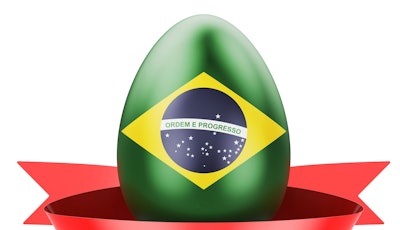
You may remember that earlier this year we calculated that during January and February Brazilian egg exports weighed the equivalent of three times that of Christ the Redeemer, the statue that towers of Rio de Janeiro.
Now, figures just released by the Brazilian egg industry have revealed that for every second that goes by 1,728 eggs are laid in Brazil. My quick back-of-an-envelope calculations suggest that, if a large hen egg is 6.2 centimeters long, then enough eggs are laid in a day in Brazil to stretch from Rio de Janeiro to Sao Paulo and back if laid end to end, and there would still be plenty left over for the odd detour along the way!
In a year, that’s enough to stretch to the moon and back over four times!
Rocketing consumption
Perhaps it is of little surprise to learn that the Brazilian egg industry is living through a rather positive period, even if this year has presented its fair share of difficulties. Between 2010 and 2020, per capita egg consumption increased from 148 to 251 eggs. This year, per capita consumption is expected to be higher still, and production is predicted to reach 54.5 billion units.
And things are not expected to stop there. In 2022, Brazil’s per capita egg consumption is expected to rise to 262, according to projections from industry body, the Brazilian Association of Animal Protein (ABPA).
That egg consumption in Brazil is higher than the global average, calculated for 2018 by the International Egg Commission to be 161, is an understatement, and has been attributed to eggs becoming more readily available in the country. ABPA notes that, additionally, the higher costs of other animal proteins puts eggs in a particularly favorable position.
Going up
Food inflation is hitting Brazilian consumers hard. In September, a survey carried out by data research company DataFolha asked consumers if they had reduced or increased consumption of any foods since the start of the year. Eighty-five percent of respondents said that they had cut back on at least some items, with 67% saying that they were consuming less red meat. The survey also found that Brazilian consumers are also eating less chicken and pork, but 50% of respondents replied that their egg consumption had increased.
Additionally, old myths about eggs being unhealthy would seem to have died away, being replaced by consumer perceptions of eggs being a healthy food, ABPA notes
Despite this strong local demand, not everything is sunny for the Brazilian egg industry, which is also having to contend with strong cost increases and what it describes as less than ideal market conditions. Some smaller producers have had to exit the industry, unable to make profit. However, at least from the demand side, the year ahead would look to be more than positive, allowing the industry to achieve new heights and, who knows, reach for the stars.


















